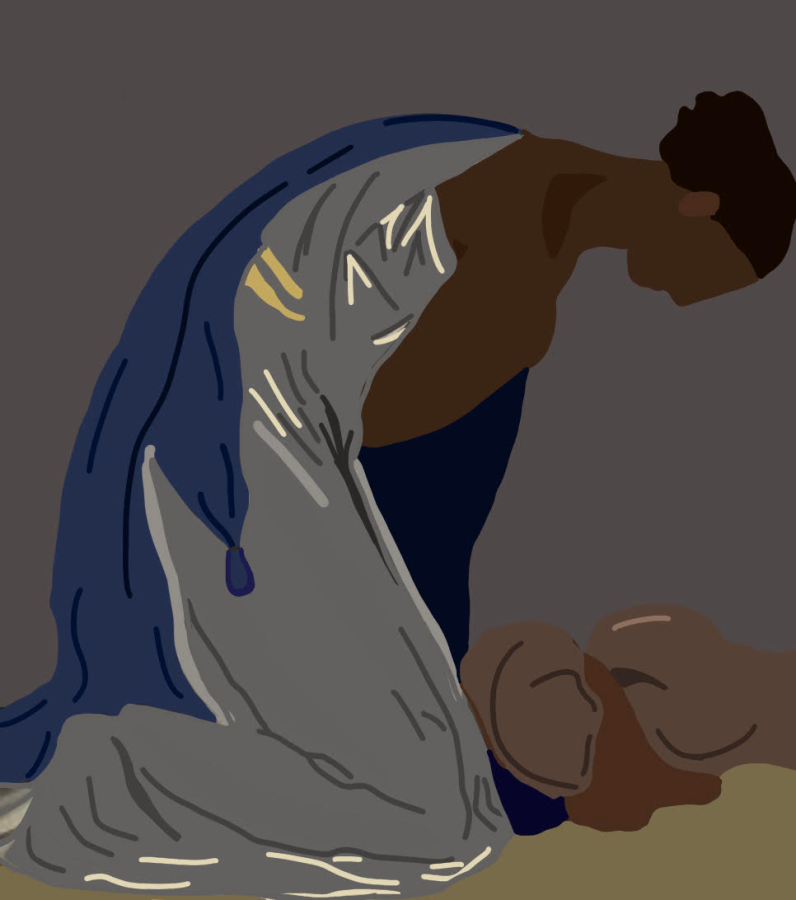Black History Month: Two Millennia in Mourning
Black Lives in Sophocles’ ‘Antigone’
February 7, 2022
“For I owe more to the dead, with whom I will spend a much longer time, than I ever will to the living,” (Sophocles, 90-92) Antigone wails to her sister, Ismene. Sophocles’ “Antigone” is a living, breathing metaphor for the anxieties of the African-American community in the face of racially motivated police brutality. In 2014, Michael Brown’s body was left on the street to wallow in his own blood for four hours before they even considered moving it. The same way that Polyneices’ body floundered in the barren fields of Thebes, emphatically left to rot without the rites and rituals of a proper burial. The Greek tragedy of “Antigone” may have been written two millennia ago, but still, it continues to clearly resonate with audiences. Through its articulate address of difficult topics such as death, grieving and civil disobedience, “Antigone” survives to be significant within the last couple of years, specifically to the Black Lives Matter social movement.
The story of “Antigone” is a timeless tragedy but unfamiliar to many. It begins grimly with the rightful anger and violence of Antigone, the daughter of the famous king of Thebes, Oedipus, over a declaration from the new sovereign. The new king, Creon, has declared a noble burial for one of Oedipus’ sons, Eteocles, after a duel between brothers, and forbids the deserved burial for the other brother, Polyneices, a supposed usurper of the kingdom of Thebes. He commands Polyneices’ corpse be left to the elements, “Convenient forage for cruising birds to feast their fill” (Sophocles, 35-36). The entirety of the play is a decisive rebellion from Antigone to King Creon demanding the ability to give her brother a proper burial, regardless of the errors he may have made while he lived. In the process of forcing his own arrogance upon the people of Thebes and defying Greek tradition, Creon loses everything he loves and pays dearly for it.
The parallels between both the events following Polyneices’ death and those following African-American victims of police brutality are heartrendingly similar. “It threatens our loved ones as if they were our enemies” (Sophocles, 15). Sophocles so easily illustrates the issues that are still prevalent around the world today and with “Antigone,” audiences are sure to be hyper-aware of the consequences of indifference and the grim reminder of the corruption it breeds.
“No bird now sings
A clear omen – their keen cries have been garbled
By the taste of a slain man’s thickened blood.
Stubbornness, you well know,
Will bring on charges of stupidity”
(Sophocles, 1128, 1136.)
Beginning in September 2016, Theater of War, a play production company centered around meaningful social causes, decided to run a dramatic retelling of “Antigone” as it related to the Black Lives Matter movement. “Antigone in Ferguson” specifically honors the memory of Michael Brown, and has been sponsored the last couple of years by Harvard’s departments of Theater, Dance and Classics. Since the beginning of the COVID-19 pandemic, they’ve moved their performances to virtual sessions, but the importance of their message still rings. The Greek tragedy centers on the justice a community feels they are owed, especially when higher authorities seem to turn a blind eye to what is morally right and wrong. “Tyranny is fortunate in many ways: it can, for instance, say and do anything it wants” (Sophocles, 547-549.)
For far too long, an unprecedented amount of police brutality against people of color has been seemingly low on the radar for the mainstream media, but as we move further into the 21st century, younger generations are picking up where their predecessors left off and making their mark on history. “Antigone” stresses to us that authority and the higher echelons of power seem to have absolutely no idea what mercy in the time of grieving looks like. Whether a walking pariah or a paragon of excellence, we all deserve the same benevolent treatment in death as we did in life. Beating a man while he’s down, while he’s already at a systemic disadvantage, and recklessly throwing compassion out the window, both King Creon and the United States law enforcement seem to take a page from the same book. “How much courage does it take to kill a dead man?” (Sophocles, 1137-1138) The only sage advice we might pull from an elite in the play comes from the prophet Tiresias, who, as he describes, “does not spear the fallen.”
For us to truly thrive as humans, we must formally acknowledge our shortcomings by fearlessly staring them straight in the face. Sophocles’ “Antigone,” while not as prevalent in popular media as it once was, certainly dares to bare our ugliness to the world. From there we can finally move forward to learn from our mistakes in the form of classical antiquity. And as Sophocles so eloquently says: “The future will be shaped by those who control it,” (Sophocles, 1492-1493.)












